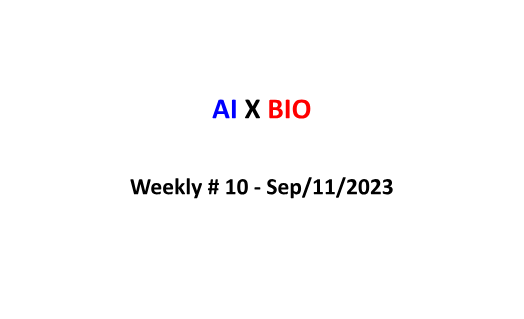- AIXBIO
- Posts
- AIXBIO Weekly #10 - Sep/11/2023
AIXBIO Weekly #10 - Sep/11/2023

Featured
Regulation & Policy
Governor Newsom's Executive Order for Ethical AI Development in California
California, recognized as the global epicenter for generative artificial intelligence, is taking significant steps to ensure the ethical and responsible use of this transformative technology. Governor Gavin Newsom has recently signed an executive order that lays out the state's approach towards AI. This order emphasizes the vast potential of GenAI, comparing its transformative power to the advent of the internet. However, it also acknowledges the inherent risks associated with such tools. To strike a balance, the state is adopting a measured approach, seeking expert opinions, and focusing on shaping a future where AI is ethical, transparent, and trustworthy.
The executive order encompasses various provisions to ensure the state remains a leader in AI while safeguarding its citizens. These include conducting a risk-analysis of potential threats posed by GenAI, establishing procurement guidelines, and developing a report on the beneficial uses of GenAI. Additionally, the state aims to provide training for government workers, fostering a workforce ready for the GenAI economy. A significant highlight is the establishment of a formal partnership with UC Berkeley and Stanford University to evaluate the impacts of GenAI on California.
#GovernorNewsom #GenAI #EthicalAI #AIInnovation #AIResearch #AIEthicsSenators Unveil Comprehensive AI Regulatory Blueprint
Sens. Blumenthal & Hawley introduce a bipartisan AI framework
Senators Richard Blumenthal and Josh Hawley have unveiled a bipartisan framework aimed at regulating artificial intelligence (AI). This proposal comes as Congress intensifies its efforts to oversee this emerging technology. The senators' framework requires AI companies to apply for licensing, emphasizing that the tech liability shield, known as Section 230 of the Communications Decency Act, will not protect these companies from potential lawsuits. Blumenthal highlighted this framework as the first stringent legislative blueprint for enforceable AI protections. He expressed optimism about the path it sets for addressing both the potential and challenges of AI. Hawley, on the other hand, believes that the principles in this framework should guide Congressional action on AI regulation.
The framework proposes the establishment of a licensing system, managed by an independent oversight body. Companies that develop AI models would be required to register with this authority, which would possess the power to audit those applying for licenses. Furthermore, the proposal calls for clarity that Section 230, which currently shields tech companies from legal consequences of third-party content, should not be applicable to AI.
#TechRegulation #ArtificialIntelligence
The EU’s latest amendments to the AI Act include new rules that cover manipulation by AI systems
The EU's recent amendments to the Artificial Intelligence Act introduce rules that address manipulation by AI systems, aiming to safeguard EU citizens from AI-related risks. However, these proposed laws are criticized for their vagueness and lack of scientific backing. Key concerns include the unclear definition of terms like "personality traits" and the need for a more comprehensive approach to defining and regulating manipulative AI techniques. The article emphasizes the importance of clear definitions and continuous multistakeholder review to ensure the Act's effectiveness in protecting individual rights, autonomy, and well-being.
#EUAiAct #AIRegulation #OECD #AISafety
Partnerships
Verge Genomics and Alexion Collaborate on AI-Driven Drug Discovery for Rare Neuro Diseases
Verge Genomics, a clinical-stage biotechnology company, has announced a significant collaboration with Alexion, a part of AstraZeneca Rare Disease. This partnership is centered on identifying novel drug targets specifically for rare neurodegenerative and neuromuscular diseases. Financially, Verge stands to receive an impressive upfront and near-term payment of up to $42 million. If future milestones are met, this could escalate to a potential $840 million, plus additional downstream royalties. The collaboration is poised to leverage the CONVERGE™ platform, a unique system that merges highly predictive human tissue datasets with advanced machine learning.
#AIinDrugDiscovery #RareDiseases #NeurodegenerativeDiseases #AstraZeneca #Collaboration
Verily and Kyverna Therapeutics Team Up to Propel Cell Therapy for Autoimmune Diseases
Verily, an Alphabet precision health tech company, and Kyverna Therapeutics, a clinical-stage cell therapy firm, have announced a significant multi-year collaboration. The partnership's primary objective is to identify new biomarkers and bring innovation to clinical trial design and execution.
A significant part of this collaboration will see Kyverna utilizing Verily’s state-of-the-art Immune Profiler to advance biomarker discovery and enhance data collection strategies.
#CellTherapy #AutoimmuneDiseases #AIinHealthcare #BiomarkerDiscovery #ClinicalTrials #CARTcellTherapy
Funding
Ibex Medical Analytics Secures $55 Million in Series C Funding - AI Adoption for Cancer Diagnosis
Ibex Medical Analytics, active AI-driven cancer diagnostics, has announced a significant $55 million Series C funding round. This round, spearheaded by 83North, saw participation from Sienna Venture Capital and returning investors like Octopus Ventures and aMoon. Since its foundation in 2016, Ibex has impressively amassed over $100 million in funding. The company's flagship Galen™ platform is designed to aid pathologists, enhancing the quality of cancer diagnoses and optimizing laboratory operations.
#AIFunding #CancerDiagnostics
DCVC has led a $14 million seed financing round for Noetik
Noetik, a computationally driven company that uses spatial biology and machine learning to understand the complex circuitry of cancer. The goal is to aid pharmaceutical teams in developing more effective cancer treatments.
Applications
GE Healthcare & Mass General Brigham: AI Algorithm for Predicting Missed Care Opportunities
GE Healthcare and Mass General Brigham have announced a collaboration to co-develop an AI algorithm aimed at predicting missed care opportunities (MCO). In preliminary tests, this AI-enabled algorithm predicted MCOs with an accuracy rate of up to 96%. The primary AI application from this partnership is the Radiology Operations Module (ROM) dashboard, a digital imaging tool designed to enhance scheduling, reduce costs, and alleviate administrative burdens on healthcare providers.
Augmedix Expands Behavioral Health Coverage for Acute and Ambulatory Care
Augmedix expands its medical documentation to behavioral health, addressing the rising demand. The company's tech enhances clinician-patient interactions & reduces burnout. New product, Augmedix Go, to launch soon
Orion Health Introduces AI-Enhanced Patient Navigation Services
Orion Health, a New Zealand-based health tech company, has announced the introduction of its new digital front door services, Virtuoso. This platform is currently serving 15 million people in Ontario and is set to be more widely available soon. The primary goal of these tools is to simplify the care processes for healthcare workers who are currently overwhelmed and to reduce their dependency on emergency departments.
Virtuoso is described as a multichannel interface where patients can have a singular point of contact with the health system. One of its standout features is a symptom-assessment tool that's enhanced with artificial intelligence. This tool can guide platform users to more targeted information and provide advice on available care.
#PatientCare #DigitalHealth
Foundation Models
TSMixer, a new all-MLP architecture, combines univariate & multivariate forecasting strengths
Time series forecasting is essential for various applications, from predicting demand to tracking pandemics. The article differentiates between univariate models, focusing on single-variable time series trends, and multivariate models that also consider cross-variate information. Recently, Transformer-based architectures have gained traction for multivariate forecasting. However, these models often fall short compared to simpler univariate linear models on standard benchmarks. This led to questions about the real benefits of cross-variate information.
The article introduces "TSMixer," an architecture that merges the strengths of univariate linear models with multivariate models. TSMixer is designed to perform exceptionally on long-term forecasting benchmarks. It's the first multivariate model to match the performance of top univariate models on these benchmarks. The article also delves into the architecture of TSMixer, highlighting its unique approach to capturing temporal patterns and cross-variate information.
A Novel Computational Fluid Dynamics Framework for Turbulent Flow Research
Google's Athena Team has unveiled a cutting-edge computational fluid dynamics framework tailored for turbulent flow research. Turbulence, found in many environmental and engineering fluid flows, is crucial in several research domains. Grasping turbulence can enhance cloud formation predictions, wildfire spread, river sedimentation, and aircraft engine combustion efficiency.
#TensorFlow #FluidDynamics #MachineLearning #GoogleAthena






